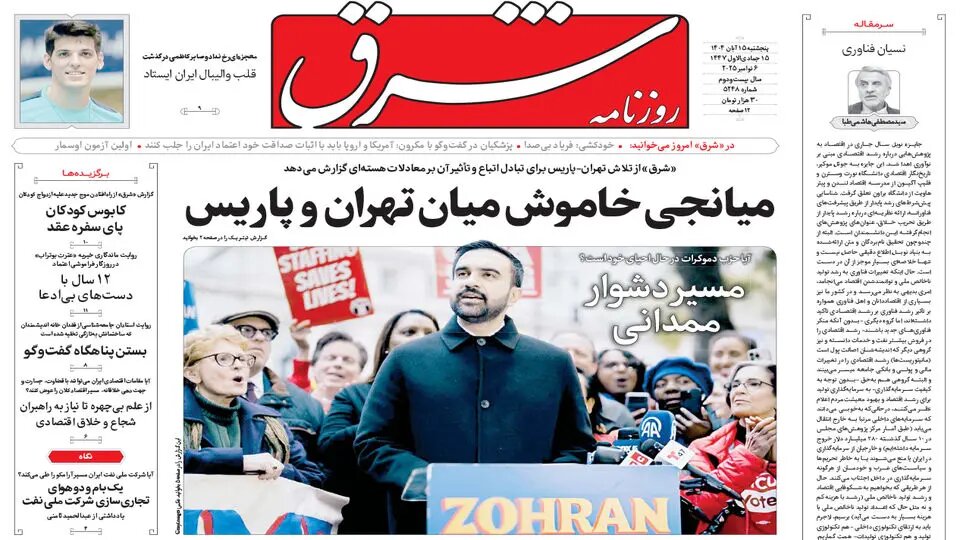An active and trust-based approach to diplomacy

TEHRAN - In an interview with Ali Bigdeli, a senior analyst on European affairs, Shargh examined the diplomatic freeze between Iran and Europe.
It wrote: Following the activation of the snapback mechanism, relations between Tehran and Europe have entered a phase of stagnation and diplomatic freeze. However, the issue of prisoner exchanges between Iran and certain European countries particularly France appears to be pursued as a form of soft diplomacy. Despite the prevailing chill in diplomatic relations, signs of efforts to reopen indirect channels and foster humanitarian engagement are emerging. Although the French Foreign Minister has emphasized that the matter of French nationals is unrelated to nuclear negotiations, in practice, such gestures could indirectly soften the atmosphere between Iran and the European Union in the short term. The simultaneous and parallel release of foreign nationals and increased cooperation with the IAEA could help prevent new resolutions from being issued. Nevertheless, these steps alone are insufficient to revive the negotiation process. To overcome the current impasse, Iran must pursue a more proactive nuclear diplomacy alongside confidence-building measures to prevent the crisis from escalating into a political and security deadlock.
Jam-e-Jam: You closed the door to negotiation, so don't complain
Jam-e-Jam criticized the IAEA's unprofessional conduct and breach of commitments. It quoted Esmail Kowsari, a member of the Parliament’s National Security and Foreign Policy Committee, as saying: From the moment the Agency violated professional principles, it could no longer expect the Islamic Republic of Iran to remain passive in the face of broken promises and distorted reports. If Mr. Grossi and his colleagues now complain about inspection restrictions, they must recognize that these are the consequences of their own misconduct. They themselves closed the path and attacked Iran mid-negotiation, committing a grave offense. This occurred despite no change in Iran’s approach to inspections or cooperation with the Agency before the conflict. As Iran has repeatedly stated, it will not alter its policies under pressure. In the current circumstances, we cannot trust the Agency unless it admits its errors and takes responsibility. Yet instead of acknowledging their mistakes, they take pride in their reports. The Agency has shared all its findings on Iran's nuclear facilities with the United States and the Zionists. Thus, the core issue is not technical inspections, but the hegemonic policies of global arrogance led by the U.S. and the Zionist regime that exploit the Agency as a tool to pressure Iran.
Iran: A crisis of trust between Tehran and IAEA
In a recent analysis, the Iran newspaper highlighted the evident contradictions in Rafael Grossi's statements. On one hand, Grossi acknowledges that there is currently no need to refer Iran’s case to the UN Security Council. On the other hand, by using phrases such as cooperation must seriously improve, he perpetuates a climate of pressure. None of his remarks addresses the more critical issue: the attacks by the United States and Israel on safeguarded Iranian nuclear sites; an event that, under the IAEA Charter, should have prompted immediate condemnation. More importantly, Grossi continues to expect Iran’s cooperation with the Agency despite the absence of any clear technical framework for inspecting the damaged facilities. This contradiction lies at the heart of the trust crisis between Tehran and the IAEA: the Agency demands full cooperation without first restoring the necessary security and technical protocols, while Iran insists that a defined framework must be established for its current situation. Until a new oversight mechanism is determined in the aftermath of the attacks, expecting full cooperation from Iran is unreasonable.
Khorasan: Real deterrence comes from missiles , not signed agreements
The Zionist regime launched a sudden assault on Iran’s military infrastructure, targeting radar systems, air defenses, and command centers of the armed forces. Israel imagined that Iran will be defeated within a few hours, but it failed to assess the capabilities of Iran's missile. During the 12-day war, despite Israeli claims of destroying missile launchers and missile sites, Iran’s firepower intensified daily. By the fourth day, Tel Aviv was seeking intermediaries and proposing a ceasefire. Iran agreed to conditionally halt operations on the condition that it would deliver the final blow. At dawn on June 24, Iran launched its heaviest missile barrage toward Israel. Since that day, Israel has not dared to repeat its aggression against Iranian territory. In the logic of the Zionist regime, deterrence is not built through diplomacy or agreements, but through real power and reciprocal response. In wartime, pacifism without strength is more a missed opportunity than a rational strategy. A paper agreement only holds weight when backed by missile capability and the will to respond, and this is precisely what must remain central in Iran's strategic calculations.
Leave a Comment